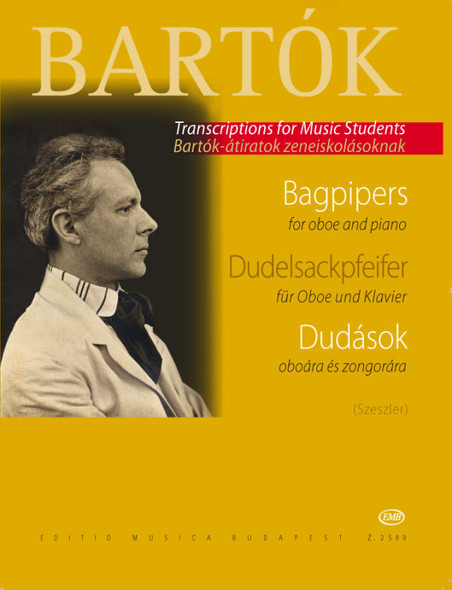Description
Bartók Béla: An Evening in the Village - Slovak Peasant's Dance / Transcribed by Váczi Károly / Editio Musica Budapest Zeneműkiadó / 1957 / Bartók Béla: Este a székelyeknél - Tót legények tánca / Átírta Váczi Károly
Paperback
Made in Hungary
Setting: Clarinet and Piano
Series: Bartók Transcriptions for Music Students
Period: 20th Century
Length: 12 pages
Format: Bach (23 x 30,2 cm)
Weight: 0.078 kg
Published: 1957
Publisher: Editio Musica Budapest Zeneműkiadó
Item number: 2267
ISMN: 9790080022672 / 979-0080022672
Hangszer/letét: Klarinét és zongora
Sorozat: Bartók-átiratok zeneiskolásoknak
Korszak: XX. század
Terjedelem: 12 oldal
Formátum: Bach (23 x 30,2 cm)
Súly: 0,078 kg
Első megjelenés: 1957
Kiadó: Editio Musica Budapest Zeneműkiadó
Katalógusszám: 2267
Both pieces in the present volume are transcriptions from Béla Bartók’s Ten Easy Piano Pieces, a series composed for pedagogical purposes in 1908. Their themes are reminiscent of Hungarian and Slovak folk songs, although they are not authentic folk melodies. As Bartók explained in an American interview, An Evening in the Village was ''an original composition that is [...] with themes of my own invention but [...] the themes are in the style of the Hungarian-Transylvanian folk tunes. There are two themes. The first one is a parlando-rubato-rhythm and the second one is more in a dance-like rhythm. The second one is more or less the imitation of a peasant flute playing.'' An Evening in the Village has become one of Bartók’s most popular works, which the composer himself was fond of playing at recitals. In 1931 he also orchestrated it as no. 1 of Hungarian Sketches. The transcription for clarinet and piano was made by the clarinettist Károly Váczi (1892-1976).
A kötetben közreadott két átirat Bartók Béla 1908-ban pedagógiai céllal komponált zongoradarab-sorozatából, a Tíz könnyű zongoradarabból származik. Mindkét darab témái népdalszerűek, de nem valódi népi dallamok. Amint Bartók egy amerikai interjúban elmondta, az Este a székelyeknél ’’eredeti kompozíció, azaz témái sajátjaim, de ezek a témák az erdélyi magyar népdalok stílusát követik. Két témája közül az első parlando-rubato ritmusú, a másik inkább táncritmusú ” többé-kevésbé egy paraszti furulyázás imitációja’’. A rendkívül népszerű darabot, amelyet maga Bartók is előszeretettel játszott hangversenyein, a zeneszerző 1931-ben zenekarra is meghangszerelte, a Magyar képek 1. számaként. Az átiratot klarinétra és zongorára Váczi Károly (1892-1976) klarinétművész készítette.























